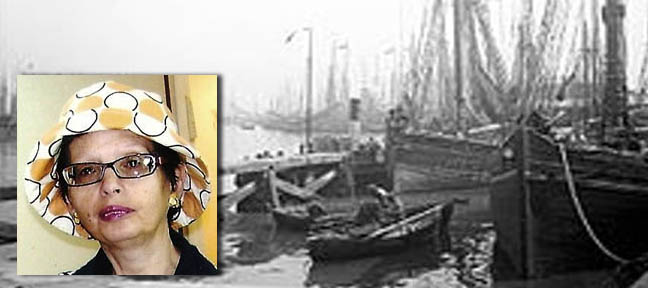Article in PDF (Download)
Sugar Cones and Salt Men by Natalie Wood
“Dance ti’ thy daddy, ti’ thy mammy sing;
Thou shall hev a fishy on a little dishy,
Thou shall hev a salmon when the boat comes in.”
—————
In those years, time ran so fast, it was like reliving the Creation:
‘And God called the light Day, and the darkness He called Night.
And there was evening and there was morning, one day’.
That’s how it was; over and done. First the boat chugged in, spluttered to an asthmatic halt and spat me out like phlegm onto Grimsby Docks.
There, I – Azriel Selig ben Judah Arye Saltzberg the Lithuanian – was left to flounder, a skinny Yiddish-speaking fish, ready to be chopped, fried, then swallowed whole by the rapacious currents of the merciless North Sea.
Yet I lived. Somehow. But it was always dark. Forever wet. Nightfall. Rainfall. A vicious, sodden, black, ever-tightening circle. Back and forth. Round and round.
No sooner did a craven sun crawl timidly from behind a massive cloud, than it scuttled back inside, giving way to inundations hard and heavy enough to drown me.
But named as one whom God would help, I fast learnt that heaven aids those who shift for themselves.
“To think”, I told the family later, “I’d sailed from home to find the Goldener Medinda – the ‘golden state’ of America – land of the free.
“But I’d been duped; snapped on a fisherman’s hook; reeled in on a three-ply yarn; caught by a brazen liar who snatched my money and stole my trust”.
Huh! I shrugged it off. It was sink or swim. So I stayed here on this short stretch of blustered north-eastern coast; remained true to God but accepted British ways, suffering the tides to swirl their murky waters about me.
Still, the bewildering ache of semi-bereavement lingered. I became sluggish; a stick-in-the-sea-mud, seemingly with nothing to do and no place to live. At last, for want of decent kosher food and a warm bed, I turned inland to work as a glazier, with the world now reflected through the plaintive screech of wheeling seagulls and the mournful wail of foghorns.
“Finally”, I said, “the new became old; the foreign, familiar and together with the freezing damp, the whole wrapped a peculiar coarse blanket of consolation around me.
The unceasing clash of metal on metal – the stench of fish – the unyielding ugliness – they all helped to form a backdrop to the drudgery of a life enlivened only by my trips to recite daily and Sabbath prayers at the synagogue where I was elected secretary.
At intervals, the days would lengthen; become brighter. But all too soon, the cycle of brooding twilights would start to turn.
Then my walks were sad, my footsteps slow. I’d wander back to the quayside where I’d first run aground to gaze at the battered trawlers bobbing on the spume, pleading silently for the return of something I had never quite owned.
In my last years, my family said the untimely passing of my dear Esther Rivka had turned me funny; that I should have re-married. But I didn’t want to start with another woman. It would have meant too much change.
Then they announced as I grew older that I needed personal care. By then, I felt too weak to argue.
So first I lived with my eldest son, Harry and then his youngest brother, Sammy. But their wives didn’t want me under their feet and both got rid of me. They complained that I’d become an old man with unpleasant habits; that it wasn’t fair. It was one thing performing a family duty. But I was an inconvenience and my presence, an embarrassing imposition. Could I be placed in a hospital?
Instead, I struggled to get back to my own house; the one I’d rented all my married life and that had somehow remained vacant. Sometimes, I received polite invitations for Sabbath and holiday meals but still, I felt abandoned and looked for new friends.
So I bought a sugarloaf from the grocer, found the miniature hammer Esther had used to smash the sheets of kosher salt we used at Passover and broke the sugar into tidy lumps.
This is how and why Police Constable Colin Jennings found me wandering between Duke Street and Grafton Street handing out the sugar lumps to children who were playing hopscotch outside their homes.
I didn’t mean to frighten them and on the day it happened, I’d popped the hammer inside my overcoat pocket at the last minute as I’d left home, just in case I’d needed it. But one little mite ran indoors to tell her mam about me. After that, everything became blurred; I felt dazed and never quite worked out where I was taken.
I didn’t like it there and was glad that soon after, I shut my eyes for the last time in the ‘real’ world and didn’t wake up again.
In one way I never did much after leaving my birthplace of Kruky in Lithuania. But I did father six children and so helped the continuation of the Jewish people. As a religious man, I like that idea and also how newer generations visit me now and then and read the inscription on my tombstone. This will always be a comfort.
© Natalie Wood



One Reply to “Natalie Wood – Sugar Cones and Salt Men”